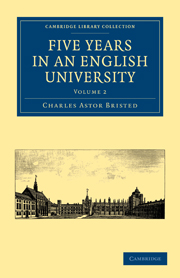Book contents
- Frontmatter
- Contents
- The Cambridge System of Education in its Intellectual Results
- Physical and Social Habits of Cambridge Men.—Their Amusements, &c
- On the State of Morals and Religion in Cambridge
- The Puseyite Disputes in Cambridge, and the Cambridge Camden Society
- Inferiority of our Colleges and Universities in Scholarships
- Supposed counterbalancing Advantages of American Colleges
- The Advantages of Classical Studies, particularly in reference to the Youth of our Country
- What can we, and what ought we, to do for our Colleges
- APPENDIX: Containing Six Exercises for Trinity Declamations, and Three for the Members' Prize
- ERRATA
APPENDIX: Containing Six Exercises for Trinity Declamations, and Three for the Members' Prize
Published online by Cambridge University Press: 28 April 2011
- Frontmatter
- Contents
- The Cambridge System of Education in its Intellectual Results
- Physical and Social Habits of Cambridge Men.—Their Amusements, &c
- On the State of Morals and Religion in Cambridge
- The Puseyite Disputes in Cambridge, and the Cambridge Camden Society
- Inferiority of our Colleges and Universities in Scholarships
- Supposed counterbalancing Advantages of American Colleges
- The Advantages of Classical Studies, particularly in reference to the Youth of our Country
- What can we, and what ought we, to do for our Colleges
- APPENDIX: Containing Six Exercises for Trinity Declamations, and Three for the Members' Prize
- ERRATA
Summary
Some curiosity having been manifested by professors and literary men of my acquaintance in regard to the standard of English Composition among the young men at Cambridge, and also respecting the University Latin Essays, I here reprint six of the exercises for Trinity Declamations, &c, one of which was unsuccessful; and three for the Members' Prize, one of which took the second prize, and one was unsuccessful. It will be seen, therefore, that they are not by any means picked out as the very best. Nor will they, treating too as some of them do of subjects since adorned by the pens of Carlyle and Macaulay, be deemed subject to criticism like the work of maturer years.
“WAS THE USURPATION OF OLIVER CROMWELL ULTIMATELY BENEFICIAL TO ENGLAND?”
Declamation to which was adjudged the first prize cup. Trinity College, Cambridge, 1843.
There are pages which we could wish blotted from the book of history. Nations as well as individuals suddenly go mad. Such national madness is indeed generally a monomania, leaving the minds of its subjects sane on all points save “the one fixed idea,” but it is not on that account the less fearful in its ravages, or deplorable in its effects. On such occasions men reject with disdain the counsels of experience, disown the promptings of reason, and hurrying forward in pursuit of some delusive phantom plunge blindfold into those very dangers, to avoid which all their efforts have been directed.
- Type
- Chapter
- Information
- Five Years in an English University , pp. 175 - 452Publisher: Cambridge University PressPrint publication year: 2010First published in: 1852



